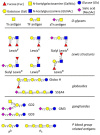Tumor-associated glycans and their role in gynecological cancers: accelerating translational research by novel high-throughput approaches
- PMID: 24957768
- PMCID: PMC3901231
- DOI: 10.3390/metabo2040913
Tumor-associated glycans and their role in gynecological cancers: accelerating translational research by novel high-throughput approaches
Abstract
Glycans are important partners in many biological processes, including carcinogenesis. The rapidly developing field of functional glycomics becomes one of the frontiers of biology and biomedicine. Aberrant glycosylation of proteins and lipids occurs commonly during malignant transformation and leads to the expression of specific tumor-associated glycans. The appearance of aberrant glycans on carcinoma cells is typically associated with grade, invasion, metastasis and overall poor prognosis. Cancer-associated carbohydrates are mostly located on the surface of cancer cells and are therefore potential diagnostic biomarkers. Currently, there is increasing interest in cancer-associated aberrant glycosylation, with growing numbers of characteristic cancer targets being detected every day. Breast and ovarian cancer are the most common and lethal malignancies in women, respectively, and potential glycan biomarkers hold promise for early detection and targeted therapies. However, the acceleration of research and comprehensive multi-target investigation of cancer-specific glycans could only be successfully achieved with the help of a combination of novel high-throughput glycomic approaches.
Figures
Similar articles
-
Quantitative O-glycomics based on improvement of the one-pot method for nonreductive O-glycan release and simultaneous stable isotope labeling with 1-(d0/d5)phenyl-3-methyl-5-pyrazolone followed by mass spectrometric analysis.J Proteomics. 2017 Jan 6;150:18-30. doi: 10.1016/j.jprot.2016.08.012. Epub 2016 Aug 29. J Proteomics. 2017. PMID: 27585995
-
Specific glycosylation of membrane proteins in epithelial ovarian cancer cell lines: glycan structures reflect gene expression and DNA methylation status.Mol Cell Proteomics. 2014 Sep;13(9):2213-32. doi: 10.1074/mcp.M113.037085. Epub 2014 May 22. Mol Cell Proteomics. 2014. PMID: 24855066 Free PMC article.
-
Glycan-specific antibodies as potential cancer biomarkers: a focus on microarray applications.Clin Chem Lab Med. 2020 Sep 25;58(10):1611-1622. doi: 10.1515/cclm-2019-1161. Clin Chem Lab Med. 2020. PMID: 32324152 Review.
-
Mass spectrometric profiling reveals association of N-glycan patterns with epithelial ovarian cancer progression.Tumour Biol. 2017 Jul;39(7):1010428317716249. doi: 10.1177/1010428317716249. Tumour Biol. 2017. PMID: 28681696
-
Sweet systems: technologies for glycomic analysis and their integration into systems biology.Crit Rev Biochem Mol Biol. 2021 Jun;56(3):301-320. doi: 10.1080/10409238.2021.1908953. Epub 2021 Apr 5. Crit Rev Biochem Mol Biol. 2021. PMID: 33820453 Review.
Cited by
-
Multiplex determination of serological signatures in the sera of colorectal cancer patients using hydrogel biochips.Cancer Med. 2016 Jul;5(7):1361-72. doi: 10.1002/cam4.692. Epub 2016 Mar 19. Cancer Med. 2016. PMID: 26992329 Free PMC article.
-
Targeting Glycans and Heavily Glycosylated Proteins for Tumor Imaging.Cancers (Basel). 2020 Dec 21;12(12):3870. doi: 10.3390/cancers12123870. Cancers (Basel). 2020. PMID: 33371487 Free PMC article. Review.
-
Mucins MUC16 and MUC1 are major carriers of SLe(a) and SLe(x) in borderline and malignant serous ovarian tumors.Virchows Arch. 2016 Jun;468(6):715-22. doi: 10.1007/s00428-016-1929-6. Epub 2016 Mar 22. Virchows Arch. 2016. PMID: 27003157
-
Association of Glycosylation-Related Genes with Different Patterns of Immune Profiles and Prognosis in Cervical Cancer.J Pers Med. 2023 Mar 15;13(3):529. doi: 10.3390/jpm13030529. J Pers Med. 2023. PMID: 36983711 Free PMC article.
-
Chondroitin Sulfate Proteoglycan 4 Provides New Treatment Approach to Preventing Peritoneal Dissemination in Ovarian Cancer.Int J Mol Sci. 2024 Jan 28;25(3):1626. doi: 10.3390/ijms25031626. Int J Mol Sci. 2024. PMID: 38338902 Free PMC article.
References
-
- Konska G., Guerry M., Caldefie-Chezet F., De Latour M., Guillot J. Study of the expression of tn antigen in different types of human breast cancer cells using vva-b4 lectin. Oncol. Rep. 2006;15:305–310. - PubMed
-
- Danussi C., Coslovi A., Campa C., Mucignat M.T., Spessotto P., Uggeri F., Paoletti S., Colombatti A. A newly generated functional antibody identifies tn antigen as a novel determinant in the cancer cell-lymphatic endothelium interaction. Glycobiology. 2009;19:1056–1067. doi: 10.1093/glycob/cwp085. - DOI - PMC - PubMed
LinkOut - more resources
Full Text Sources
Other Literature Sources


